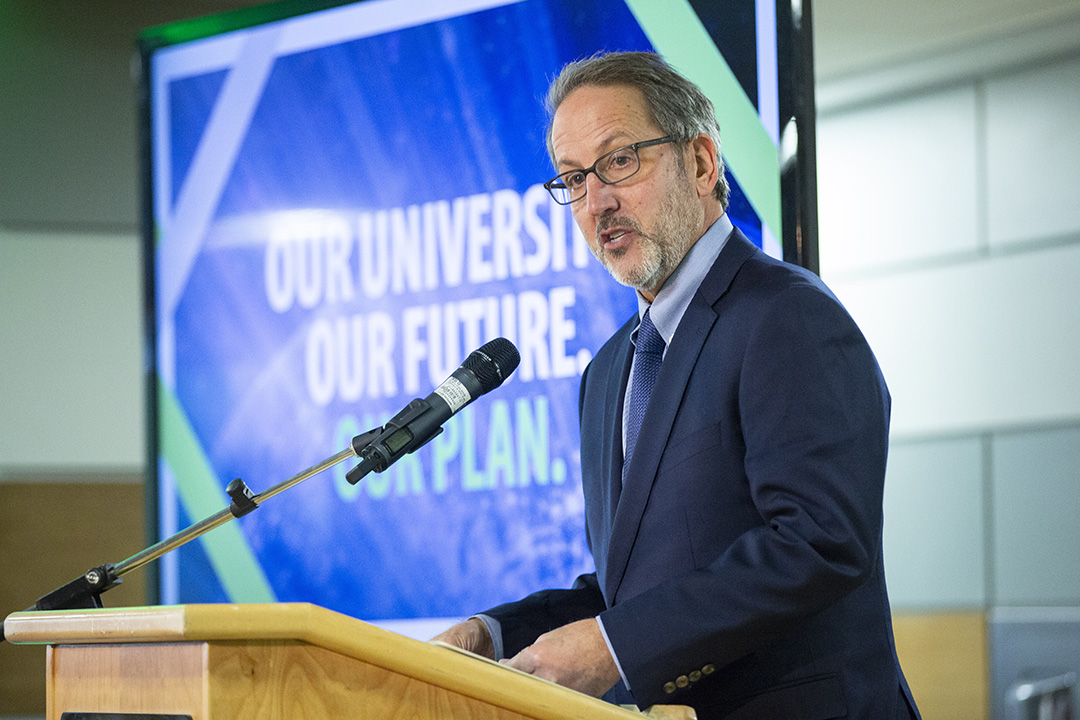
Jay Famiglietti: Inspiring communities
Whether it is at the White House or the United Nations, in the community or in the classroom, Dr. Jay Famiglietti (PhD) is committed to communicating the science of discovery.
By James ShewagaA former NASA Jet Propulsion Laboratory scientist and a world-leading hydrology researcher, Famiglietti joined the University of Saskatchewan (USask) in 2018 as the Canada 150 Research Chair in Hydrology and Remote Sensing and as the executive director of the Global Institute for Water Security—the No.1-ranked institute for water research in the country.
Leading a research group that accesses advanced satellite data to track changes in freshwater availability around the world, Famiglietti firmly believes it is the responsibility of researchers to actively reach out to share their findings with local and global audiences—a key commitment in USask’s new university plan to inspire communities and to be The University The World Needs.
“Faculty members have the privilege to do this research, to see some of the satellite data for the first time and to do whatever it is that we want to do, and with that privilege I think comes the responsibility of communicating and explaining why it is important,” said Famiglietti, who is also a professor of hydrology in USask’s School of Environment and Sustainability and in the Department of Geography and Planning. “It’s time for us to engage, and to engage deeply.”
Famiglietti certainly does his part, testifying before Congress and participating in White House, Pentagon, State Department and United Nations briefings on groundwater issues, drought forecasts and climate change. He also regularly shares research findings with the general public through speaker series like the recent TEDxUSask event, as well as with major media outlets, from the likes of The Globe and Mail, The New York Times and The Washington Post, to network TV appearances with the CBC, BBC, CNN, CBS, NBC, HBO and PBS.
What Famiglietti’s team’s research confirms is that freshwater availability and sustainability is not only a growing global crisis in drought-stricken parts of the world, but increasingly concerning in areas of North America as well.
“In many parts of the world, especially in the mid-latitude parts of the world, water is going to be increasingly scarce, especially in our groundwater aquifers,” he said. “Those are being overtaxed and pumped at an unsustainable rate and so that will pose major threats for water availability, water security and food security as well … In many parts of the U.S. and probably in Canada as well, we are past that time when you don’t have to worry about it. We are at a time when we do need to think about it, so that is why the education part of it is so important. It is absolutely essential that we engage with the community.”
Famiglietti said it was USask’s commitment to world-leading hydrology research and the government’s strong support of that work, that brought him north from California to Saskatchewan last year.
“It might not be well-known publicly that there has been this huge investment in water and hydrology at USask, but we certainly know in the hydrologic community,” he said. “It’s the investment, it’s the resources, it’s the support and the confidence in the information that scientists are bringing to the table; those are all things that brought me here.”
Article re-posted on .
View original article.

